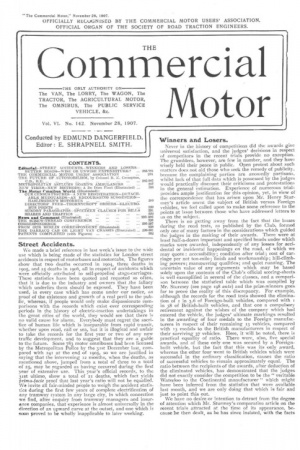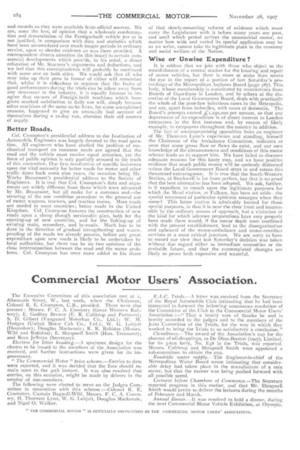Street Accidents.
Page 1

Page 2

If you've noticed an error in this article please click here to report it so we can fix it.
We made a brief reference in last week's issue to the wide use which is being made of the statistics for London street accidents in respect of motorbuses and motorcabs. The figures show that two deaths occurred in 1904, three deaths in 1905, and 25 deaths in 1906, all in respect of accidents which were officially attributed to self-propelled stage-carriages. These statistics have been quoted and requoted so often, that it is due to the industry and owners that ,the fallacy which underlies them should be exposed. They have been used, in every case which has come under our notice, as proof of the existence and growth of a real peril to the public, whereas, if people would only make dispassionate comparisons with the records which exist over corresponding periods in the history of electric-traction undertakings in the great cities of the world, they would see that there is no valid cause for alarm. Everybody must regret the sacrifice of human life which is inseparable from rapid transit, whether upon road, rail or sea, but it is illogical and unfair to take the records for the first year or two of any new traffic development, and to suggest that they are a guide to the future. Some 783 motor omnibuses had been licensed by the Metropolitan Police by the 31st December last, compared with 241 at the end of 19°5, so we are justified in saying that the intervening 12 months, when the deaths, as mentioned above, jumped from a total of three to a total 'of 25, may be regarded as having occurred during the first year of extensive use. This year's official records, to the 3ist ultimo, show a total of 21 deaths, which fact yields prima-facie proof that last year's ratio will not be equalled. We invite all fair-minded people to weigh the accident statistics during the first few years of complete electrification of any tramway system in any large city, in which connection we find, after enquiry from tramway managers and insurance companies, that experience is almost universally in the direction of an upward curve at the outset, and one which is soon proved to be wholly inapplicable to later working.
Winners and Losers.
Never in the history of competitions did the awards give universal satisfaction, and the judges' decisions in respect of competitors in the recent trials provide no exception. The grumblers, however, are few in number, and they have wisely held their peace in public. Open protest about such matters does not aid those who seek the remedy of publicity, because the complaining parties are avowedly partisans, whilst lack of that full data which is possessed by the judges would practically discount their criticisms and protestations in the general estimation. Experience of numerous trials provides ample justification for this opinion, yet, in view of the correspondence that has arisen upon Mr, Henry Sturiney's article anent the subject of British versus Foreign vehicles, we feel called upon to make some reference to the points at issue between those who have addressed letters to us on the subject.
There is no getting away from the fact that the losses during the road tests, as published by the Club, formed only one of many factors in the considerations which guided the judges in the making of their awards. There were at least half-a-dozen important and specified heads under which marks were awarded, independently of any losses for accidental or incidental happenings on the road, of which we may quote : accessibility; condition after trial ; cost of carriage per net ton-mile; finish and workmanship ; hill-climbing powers; manceuvring qualities; and quiet running. The uncertain value of any arguments which may be based solely upon the contents of the Club's official scoring-sheets is well exemplified in several of the classes, and a comparison between the statistical table which was compiled by Mr, Sturrney (see page 198 ante) and the prize-winners goes far to prove the reality of this discrepancy. For example, although the records for the road tests showed the elimination of i in 3.6 of Foreign-built vehicles, compared with in 38 of British-built vehicles, and that one a compulsory retirement against the wishes of the company which had entered the vehicle, the judges' ultimate markings resulted in the awarding of four medals to the Foreign manufacturers in respect of their remaining 13 vehicles, compared with 13 medals to the British manufacturers in respect of their surviving 37 vehicles. Here, it will be noted, there is practical equality of ratio. There were, also, five special awards, and of these only one was secured by a Foreignbuilt vehicle, but the fact that this was its only award, whereas the other four went to British vehicles which were successful in the ordinary classification, causes the ratio of successful vehicles to remain approximately equal. The ratio between the recipients of the awards, after deduction of the eliminated vehicles, has demonstrated that the judges did not exactly consider the competition to be the "veritable Waterloo to the Continental manufacturer" which might have been inferred from the statistics that were available last month, and we are only doing that which is fair and just to point this out.
We have no desire or intention to detract from the degree of attention which Mr. Sturmey's comparative article on the recent trials attracted at the time of its appearance, because he then dealt, as he has since insisted, with the facts
and records as they were available from official sources. We are, none the less, of opinion that a wholesale condemnation and denunciation of the Foreign-built vehicle per se is not justified, in comparison with data and statistics which have been accumulated over much longer periods in ordinary service, upon so slender evidence as was there provided. A correspondent directs attention (in this issue) to certain commercial developments which provide, in his mind, a direct refutation of Mr. Sturmey's arguments and deductions, and we feel that this correspondence will probably be continued with some zest on both sides. We would ask that all who may take up their pens in favour of either will remember that. whilst it is ridiculous to suppose that the fruits of good performances during the trials can be taken away from
any newcomer in the industry, it is equally fatuous to im agine that owners of Foreign-built machines which have given marked satisfaction in daily use will, simply because other machines of the same mcke have, for some unexplained reasons, happened to give an unusually bad account of themselves during a 22-day run, abandon their old sources of supply.
Better Roads.
Col. Crompton 's presidential address to the Institution of Automobile Engineers was largely devoted to the road question. All engineers who have studied the problem of mechanical transport on common roads are agreed that the road and the vehicle must receive equal attention, yet the force of public opinion i.s only partially aroused to the truth of this contention. Our first recollection of specific insistence upon the vital necessity for better roads for motor and other traffic dates back some nine years, the occasion being Mr. Worbv Beaumont's presidential address to the Society of Engineers. It is true that Col. Crompton's data.and arguments are widely different from those which were advanced by Mr. Beaumont, but all make for a common end—the securing of the one condition precedent to the general use of motor wagons, tractors, and traction trains. More roads are needed in most countries ; better roads in the United Kingdom. Col. Crompton foresees the construction of new roads upon a cheap though serviceable plan, both for the opening-up of new countries, and for the linking-up of existing main, secondary, and by-roads. Much has to be done in the direction of gradual strengthening and waterproofing of the roads we already possess, before any great expenditure upon new roads is likely to be. undertaken by local authorities, but there can be no two opinions of the close interconnection between the road and the motor problems. Col. Crompton has once more added to his share of that slowly-mounting volume of evidence which must carry the Legislature with it before many years are past, and until which period arrives the commercial motor, no matter how wide and varied its special application may be as we write, cannot take its legitimate place in the economy and social welfare of the Nation.
Wise or Unwise Expenditure ?
It is seldom that we join with those who object to the establishment of a central station for the housing and repair of motor vehicles, but there is more at stake than meets the eye in the report of a portion of last Saturday's pro. ceedings of the Metropolitan Asylums Board (page 287). This body, whose membership is constituted by nominations from Boards of Guardians in London, and by others at the discretion of the Local Government Board, deals with practically the whole of the poor-law infectious cases in the Metropolis, and not, apart from imbeciles, with cases of dementia. The Board's precepts exceed „4.1,25o,000 per annum, so that any department of its expenditure is of direct interest to London ratepayers in the first instance and, by reason of likely example, to ratepayers throughout the country in addition.
The fact of uncompromising opposition from an engineer of Mr. Thomson Lyon's experience and standing, himself the Chairman of the Ambulance Committee, indicates at once that some gross flaw or flaws do exist, and our own knowledge of the circumstances and conditions of this motor scheme leads us to support him. We have failed to discover adequate reasons for this hasty step, and we have positive evidence that much public money will be uselessly disbursed. unless the Local Government Board steps in and vetoes this threatened extravagance. It is true that the South-Western Station, at Stockwell is far from perfect, but that is no proof that the best alternative has been adopted. We ask, further, is it expedient to trench upon the legitimate purposes for which the Mead station, at Fulham, has been set aside—the special treatment of particular epidemic scourges when they come? This latter station is admirably located for those special purposes, in that it is near the river front and inaccessible by the ordinary means of approach, but a visitation of the kind for which advance preparations have very properly been made there would, if the motor depot were Combined with the present establishment, lead to the disorganisation and upheaval of the motor-ambulance and motor-omnibus services at a most critical juncture. We are sorry to have to record our view that last Saturday's decision was taken without due regard either to immediate necessities or the probable future, and that the contemplated changes are likely to prove both expensive and wasteful.




















